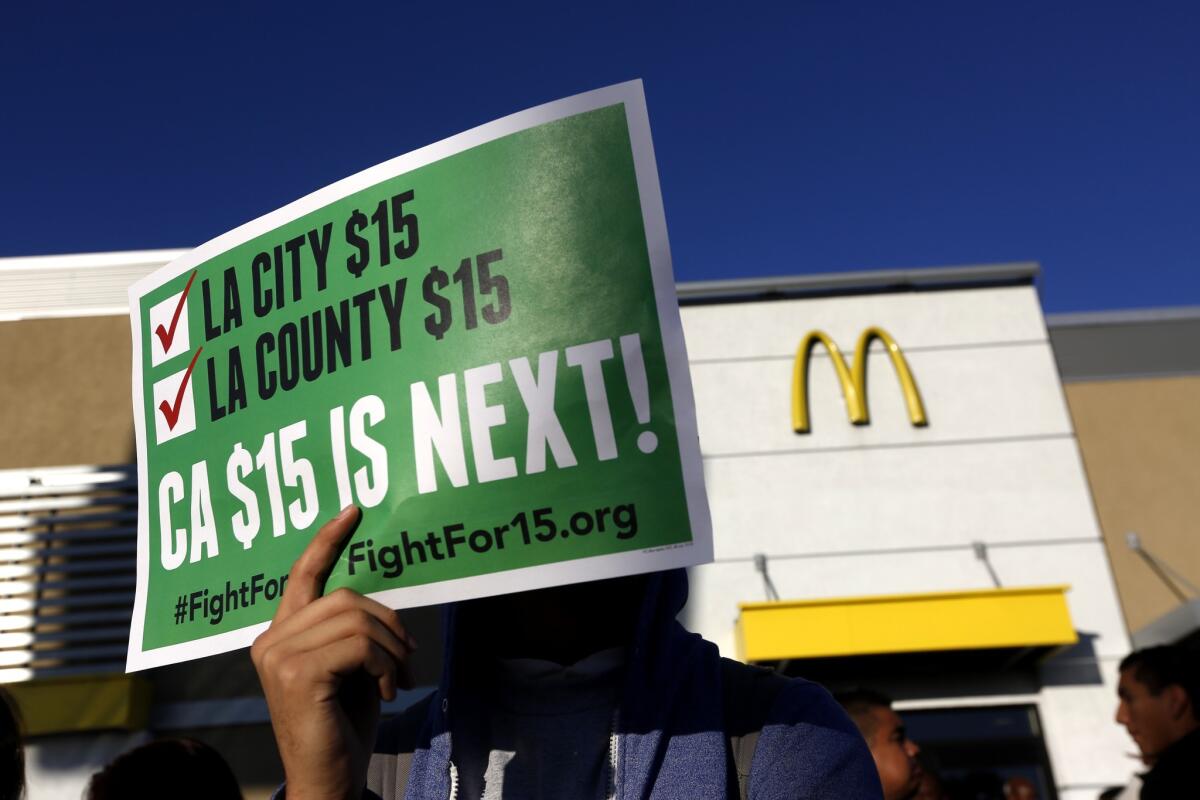Lawmakers forced to choose: Raise California’s minimum wage, or leave the issue to voters

- Share via
Reporting from Sacramento — State lawmakers now face a political ultimatum over California’s minimum wage: quickly take action to boost it above the current $10 an hour, or stand aside for a fall campaign in which voters are urged to do it themselves.
State elections officials announced Tuesday that an initiative to raise the minimum wage to $15 an hour over the next five years has qualified for the Nov. 8 statewide ballot. Championed by a union representing healthcare workers, the proposal would gradually ratchet the wage up by a dollar a year through 2021 and impose future increases with inflation.
“It’s the right time for this,” said Steve Trossman of the Service Employees International Union-United Healthcare Workers West.
The current statewide $10-an-hour minimum wage kicked in on Jan. 1, boosting the take-home pay of some 3.3 million Californians, according to a study by UC Berkeley labor researchers. Leaders of the healthcare workers union argue it’s still not enough.
“If you think about trying to live on less than $21,000 a year, it’s pretty hard to get by on that,” Trossman said.
The union’s successful drive to collect 423,236 valid voter signatures now shifts the focus to Gov. Jerry Brown and state lawmakers who hope to broker a truce between liberal activists and organized labor on one side, and conservative groups and business owners on the other.
“It won’t be easy,” Senate President Pro Tem Kevin de León (D-Los Angeles) said.
That a compromise is an option at this point in the election season is novel. For more than four decades, state election law didn’t allow a ballot initiative to be withdrawn once voter signatures were submitted. That law was revamped in 2014 to allow lawmakers one final chance to satisfy the demands of an initiative’s proponents with the hope that more sensible and balanced public policy would be drafted.
“I think that the initiative process can sometimes be a very blunt instrument,” De León said.
But the clock is ticking. The law requires any deal be reached before the list of November ballot propositions is officially certified June 30.
Negotiations may be that much tougher because a second minimum wage initiative may also land on the fall ballot. That version, crafted by the state council of the Service Employees International Union, is being circulated for voter signatures. SEIU’s version would not only raise the wage to $15 an hour by 2021, but also require employers to provide their workers three new sick days a year.
The two proposals dovetail with a national labor union campaign, called “Fight for 15,” an effort that’s been endorsed by Democratic presidential candidates Hillary Clinton and Bernie Sanders.
Business groups are balking at the idea.
“It’s based on a slogan and nothing else, without regard to the impacts,” said Jot Condie, president of the California Restaurant Assn.
Private negotiations are taking place in Sacramento, with the governor as the key player in the talks. Brown has rejected similar efforts since agreeing to a minimum wage deal in 2013. But he seemed to soften his stance earlier this year as it became clear that dueling proposals could appear on the fall ballot.
“It’s just a matter of balance,” Brown told reporters in January. “I think raising the minimum wage can be good, but it has to be done very carefully.”
The governor and his advisers have argued that a statewide $15-an-hour minimum wage would translate to an additional $4 billion in California government spending in salaries paid primarily to workers who provide services to the disabled.
A spokesman for Brown declined late last week to comment beyond the governor’s January statement.
Those close to the negotiations, who asked to speak on condition of anonymity due to the delicate nature of the talks, have identified a few sizable hurdles to striking a minimum wage deal.
One is how to account for the patchwork of local ordinances — such as those scheduled to kick in for the city and county of Los Angeles — that already require a $15-an-hour minimum wage, or would get there faster than the statewide proposals. Business groups would like a Sacramento deal that considers some way to preempt or supersede the local laws.
Employers also oppose automatic cost-of-living increases. They want lawmakers to consider ways to freeze the statewide minimum wage during future recessions.
Union leaders say those demands are non-starters. They insist they are prepared to launch a fully funded political campaign that takes the issue to the voters.
“All of the polling that we’ve done shows that it would be highly likely to pass,” Trossman said.
Few observers are willing to offer odds on a legislative compromise. Even so, there is a strong sense that the next few weeks will put the 2014 initiative overhaul law through its paces, a law touted as a way to encourage cooperation over confrontation.
“I think this will absolutely be the true test of that law,” Condie said.
Follow @johnmyers on Twitter, sign up for our daily Essential Politics newsletter and listen to the weekly California Politics Podcast
ALSO:
Prosecutors oppose Newsom’s gun control initiative
Brown asks for help on his parole ballot initiative
Updates on California politics
More to Read
Get the L.A. Times Politics newsletter
Deeply reported insights into legislation, politics and policy from Sacramento, Washington and beyond. In your inbox three times per week.
You may occasionally receive promotional content from the Los Angeles Times.











